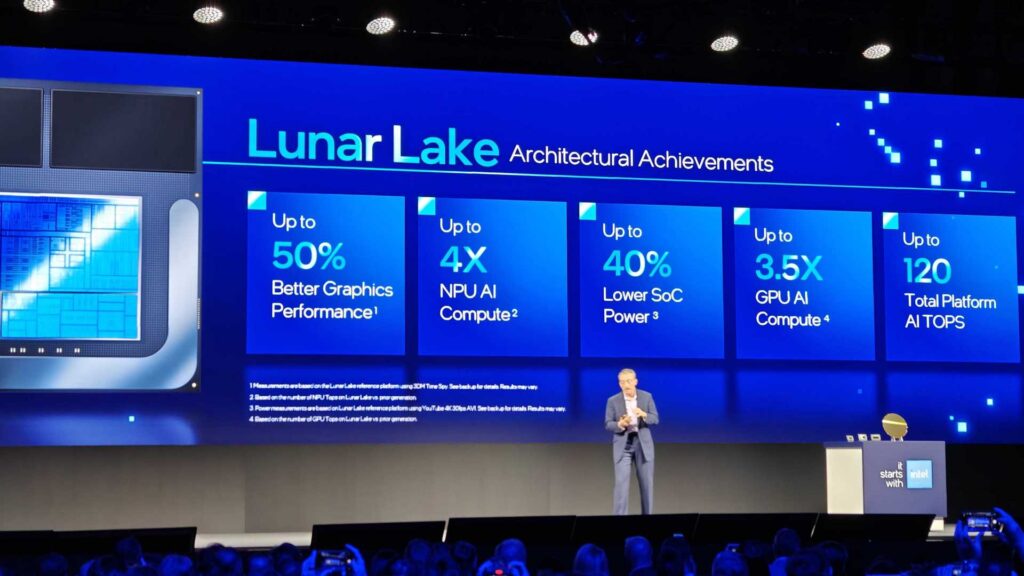Intel Corp. INTC announced new Lunar Lake chips with enhanced AI processors aimed at Copilot+ AI PCs and data center chips to take on Advanced Micro Devices AMD.
What Happened: At the ongoing Computex technology trade show in Taiwan, Intel CEO Pat Gelsinger unveiled the chipmaker's refreshed AI strategy that seeks to build on Microsoft Corp.'s MSFT "Year of AI PC" goal, apart from taking on AMD in the data center business.
The Lunar Lake series, set to be launched later this year, will offer several improvements over the current-gen Meteor Lake SoCs.

These include enhanced power efficiency, a 4x increase in NPU processing power, a 50% faster Intel Arc GPU, and on-chip memory for a smaller footprint and faster memory access, Gelsinger announced during the keynote.
The new chip is expected to power thin and light laptops by the 2024 holiday season.
Subscribe to the Benzinga Tech Trends newsletter to get all the latest tech developments delivered to your inbox.
Lunar Lake is the first Intel chip series to meet the minimum requirements for Microsoft’s Copilot+ PC standards, including greater than 40 trillion operations per second for its NPU (TOPS), and 16GB memory.
The Lunar Lake chips can reportedly deliver the same performance as Intel Meteor Lake chips with a third of the power, significantly enhancing the potential battery life of laptops equipped with the new chips.
Intel is projecting 40 million shipments of laptops by the end of 2024 and says it will have over 500 AI models optimized for its Core Ultra chip. This could potentially give Intel an edge over its competitors, including AMD and Qualcomm, in the AI PC market.
AMD In Sight, Intel Announces New AI Chips
Gelsinger also announced new server and AI chips in a bid to take on AMD as it looks to stem its market share decline.
Intel's new Xeon server chips require 67% fewer server racks at the same level of performance as its second-generation chips.
Intel also revealed that its Gaudi 3 AI chips will be priced significantly lower than those of its competitors. The Gaudi 3 accelerator kit, which includes eight AI chips, will be sold for about $125,000, while the earlier Gaudi 2 has a list price of $65,000.
This pricing strategy not only challenges AMD, it also takes on Jensen Huang-led Nvidia Corp. NVDA. According to an estimate by server vendor Thinkmate, as cited by Reuters, a comparable system with Nvidia’s H100 AI chips can cost over $300,000.
Check out more of Benzinga's Consumer Tech coverage by following this link.
Read Next: Siri Overhaul: Apple To Reportedly Unveil Powerful AI-Driven Voice Command Features At WWDC
Disclaimer: This content was partially produced with the help of Benzinga Neuro and was reviewed and published by Benzinga editors.
© 2025 Benzinga.com. Benzinga does not provide investment advice. All rights reserved.
Trade confidently with insights and alerts from analyst ratings, free reports and breaking news that affects the stocks you care about.